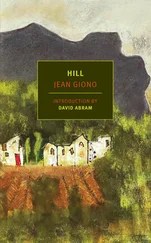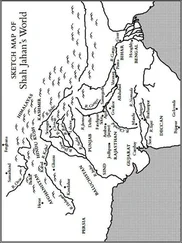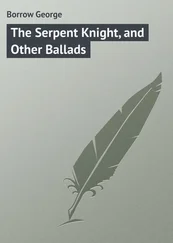Then she came, without shame in front of the men, and for all we could see, her whole body smooth as a washed stone.
We were there, on the edge of the clearing, on a moon beach. A big night beetle’s shell made the empty salad bowl ring as it scrabbled with its huge forehead and mad feet against the slippery curve of the earthenware. We could hear ourselves breathe. The wind was hot, then cool, according to whether it brought in the hollow of its hand the round air from the depths of the valleys or the air flat as a knife sharpened on the millstone of the high moors. Each time the beetle’s armature sounded in the empty bowl, the almond eyes of the pottery’s mistress gazed long at her naked daughter, then at Césaire and the shepherd, and I saw her white mouth, which was attempting silent words. The shepherd, a man of about fifty, big of bone but not heavy with flesh, without anything more than dry leather skin over leather muscles, a man of the hills, made of sun, dust, and dead leaves, the shepherd, sitting on the hard ground, facing the night, played around on a big nine-pipe flute with his fingers; he tapped out a little tune, scratching the sensitive pipes with the ends of his fingernails.
All this was difficult, as much for Césaire as for the shepherd as for the wise little girl. You could feel it, they were like big balloons full of a thick wine. And the mother only removed the cork after looking hard at me. Here I was, simpler and more fragile than fleabane. All the winds battered me, and I had just heard the thick gravel of the sky rolling in this silence when she said, “And you, mister, you know how to sleep on a grass bed in our earthen home?”
“Yes,” I said, completely overcome, and then, “yes, this won’t be the first time. I often do it. And I love the coolness of caves and that warmth you get, come morning, and then, Césaire, shepherd, let’s not put on airs, this is our true home, in fact, beneath it all.”
Little by little, equilibrium and ease returned to me. I had only to show my heart to these men, to these women, and I was sure of being loved, and I was sure of understanding all their thoughts, of being at the source of their reflections, of being their very selves, neither more fat, nor less fat, of being with them and emerging from the grass no more than they did, healthy beasts among the grasses and the beasts.
“Yes,” said the wife, “but, Césaire, don’t put him near the root.”
“What root?” I said. “What do you mean a root?”
“The root of a tree,” said the woman, “a white root. It’s there bulging from the ground like running milk, but it’s hard and full of ill will, you can’t imagine. And it’s sly and impossibly strong, and once it tried to wrap itself around my foot and it was going to draw me down to the bottom of the earth.”
“There you go again with your root,” said Césaire, his voice slow and true as he turned his head, and then he drifted off into the night once more on the beautiful wings of his gaze.
The young witch had wrapped her soft dress around her waist. The shepherd hummed quietly like a spring. The children were asleep, you could hear them sleeping, and there was the moon, over the hilly heap of naked children.
“Let me, Césaire, let me talk. On the other side of the wall, when we were at the inn in Lincel, you remember, Césaire, a house above ground. There were two charcoal burners, a man and a woman who was his wife. We heard them living. On the other side of the wall, there was a block of day or a block of night and human life. We heard him, the man, when he slapped her like a mill with arms, slapped all that was only skin and bones and rang like an empty barrel. ‘Oh, sweet Jesus,’ she said, ‘this savage is going to kill me!’ A little later, she was laughing and they began fooling around so noisily that I said to that one… (she pointed to the young redhead), ‘Sleep, close your eyes, it’s none of your business what they’re up to.’
“And then they were snoring, which wasn’t hard to imagine and was no cause for fear. There you have it. In the morning, the man would walk out, ho hum, swinging his carbide lantern, whistling that song of the Piémont, and with the first notes I said to you, ‘Césaire, wake up, he’s whistling, listen, isn’t it beautiful.’ And the woman, that was easy to imagine, too. She would come down the stairs about the time I would be sitting by the fountain combing my hair. She would come down the stairs, heavy with a big bundle of dirty laundry in her arms, and she would stop from time to time to pull up her slipping stocking, and she would come and throw it all into the washing basin, and then standing up again, she would say, ‘Ouf! That’s enough to keep me busy today.’ Yes, whatever is human I can imagine, and I do like to go off into those lives that aren’t mine and follow them a bit, and then leave them when things become difficult, and come back into the life of my body, which is what it is, but it’s mine. I like that well enough and so I don’t need to be afraid. But as for what happens behind the walls of the earth, that I don’t like, but it’s stronger than me, it draws me in and it sucks me under and it drinks me.”
She stopped for a moment to lick her lips with her big, quick tongue.
“Here,” she went on, “you could say that I have the bread and the knife, but I like the bitterness of it; it makes my brain water, you might say. I’ve spent a long time listening to the sound of the earth and I’ve always listened to the neighbors, but here, the neighbors, well, first of all, it’s those huge gray pines and then those fine old oaks as thick as men, with human voices but so heavy with a power that comes from the depths of time, so that you say to yourself, ‘If they wanted to. .!’ And at first, I lay down against the right wall. And there, all at once, as soon as I stretched out on my bed, I was plunged into sleep, like a candle blown out. A thing that blew out my life all at once. One night, I struggled with my eyelids. They lowered, I lifted them, until I had to hold them open with my fingertips. There was a purring, like a cat’s, in the earth’s big throat. And I was going into this noise, saying to myself, ‘It’s that, or that, or maybe it’s that!’ until the moment when I saw the black life of a spring, and I said, ‘Césaire, I’m making my bed over there, you can come if you like, and if you stay, there’ll be no more children, because I tell you I’m not leaving that left side anymore. My mother didn’t make me for sleeping beside a spring that never sleeps.’ And Césaire came because he has to be against a woman’s flesh, that’s his nature.
(Césaire is still out in the night; the wife wets her lips.)
“. . There, one fine evening, I heard scratching for a long time. It made a tock, and a bit of earth fell on the blanket and from the hole, a long white root came out. Ever since, it’s grown, it twists itself and twists again. Luckily, it’s blind. It’s searching for me.
“It was a summer evening, and the big door was opened wide onto the night. That one lay down beside me and put her little arm around my neck. That was no good because I have a big neck and I’m heavy, and I said to her, ‘Move your arm, I’ll hurt you,’ but she stayed close to me and I was frozen with fear and she was hot as a coal burning me where she clung. And she said to me, ‘Mama, look at the night. It’s full of stars someone’s only just sown. Who is it who sows them? Who is it who has a sack full of them? It’s fistfuls and fistfuls that someone throws. They look like rice, look.’
“She talked without stopping, all hot with her heat. And I slept with her little arm around me.”
IT WAS now the middle of the night. Madame Escoffier’s voice was slow and heavy like mortar, like the mortar of her flesh. I saw her again hardly two weeks ago, and I thought about all the bends and turns of that night as I tossed in my hands the large fruit picked at the end of the road. And I was drawn back to the clay cave and to my friends. In Lincel, in Saint-Martin-les-Eaux, you wouldn’t know that this fat woman with the beautiful children knows the countries beyond the air. When she goes off to do her shopping in Forcalquier, if she examines the eggplant, if she squeezes the artichoke, you don’t know, you couldn’t know, that she is knowledgeable in the great science of sky and earth, that she knows, according to the very deepest secrets, the eggplant’s true weight and the artichoke’s bitter blood.
Читать дальше










